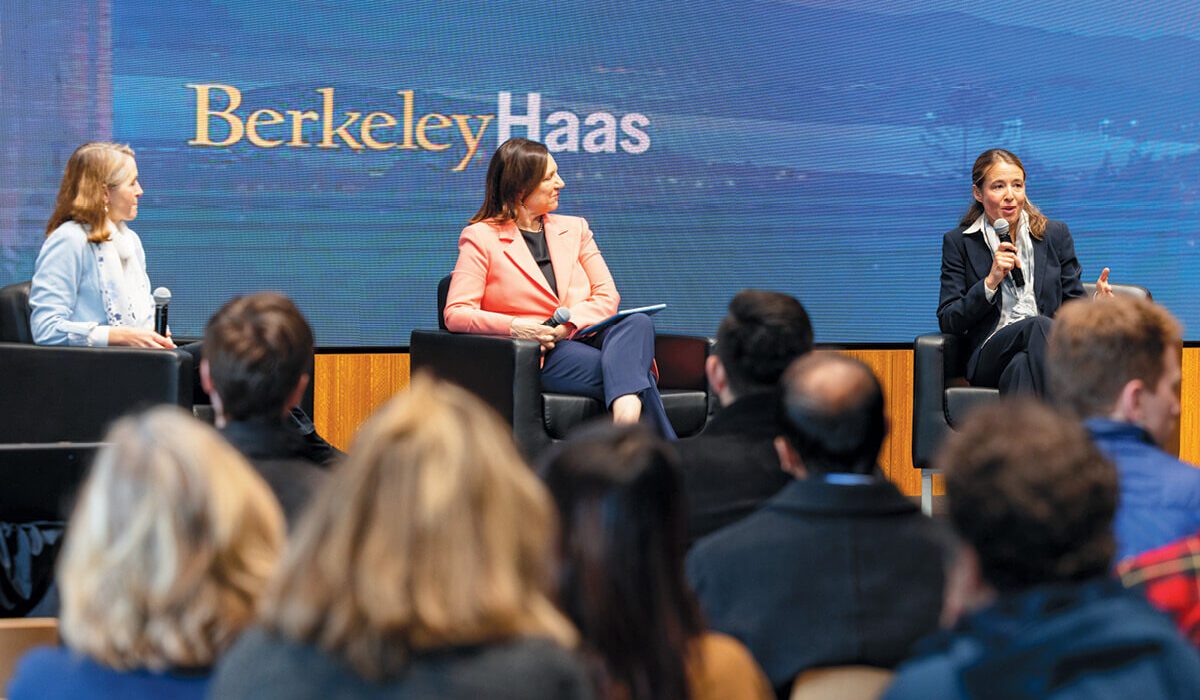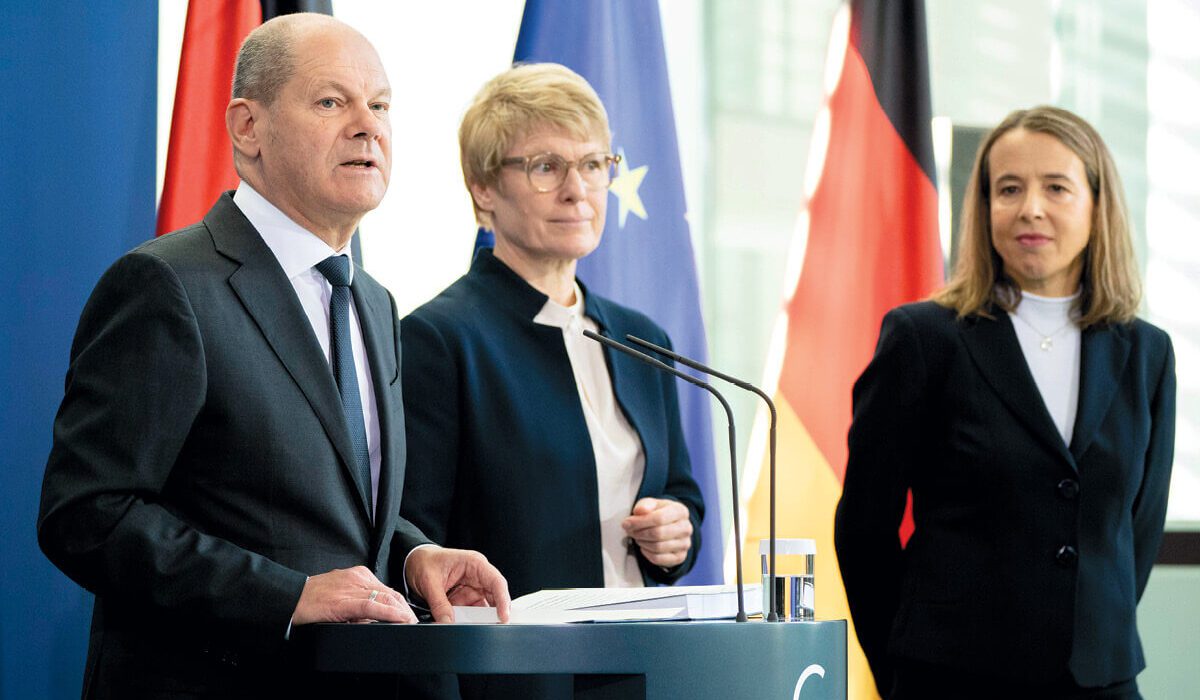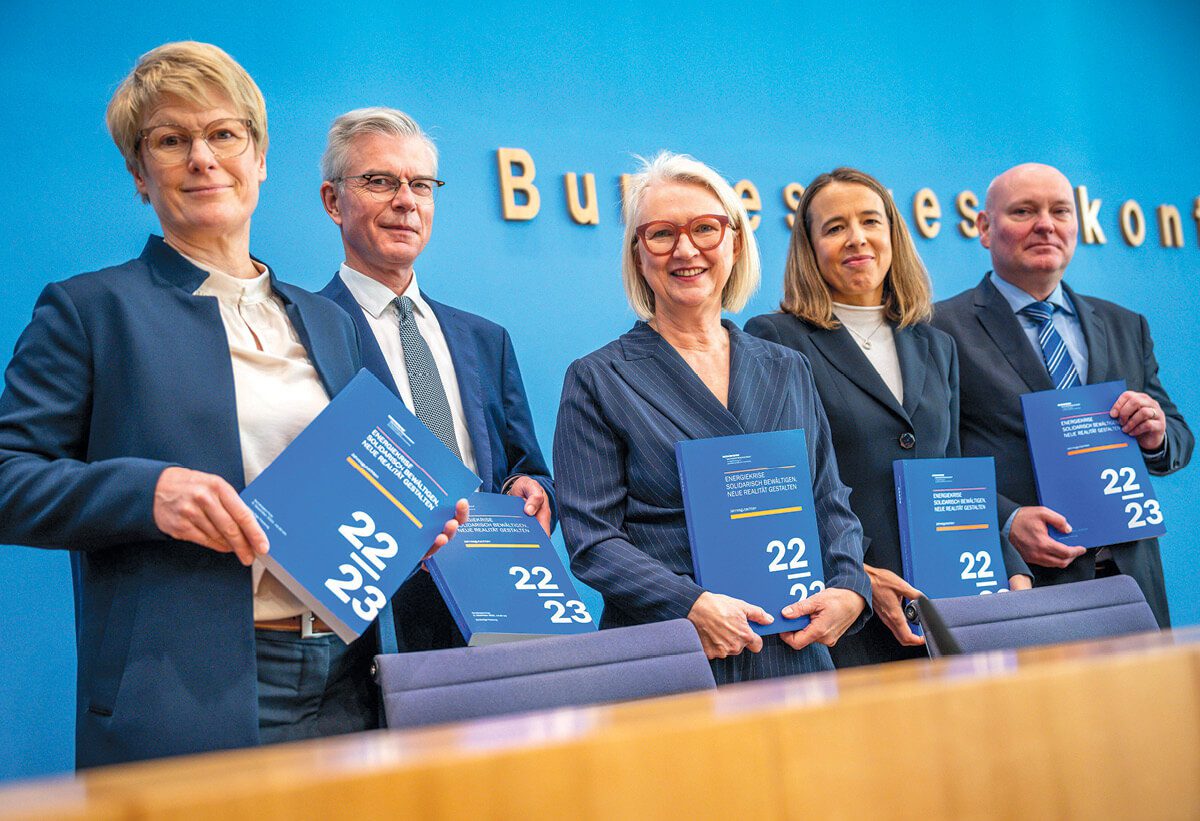Professor Ulrike Malmendier discusses her role as a top economic expert in Europe.
As a pioneering behavioral economist, Professor Ulrike Malmendier has made it her life’s work to illuminate the ways that human psychology and systematic biases influence economic behavior. Her research stands out for its originality and creativity: She’s shown that the economic conditions that prevail during a person’s life so far strongly influence their views on money for years and decades to come. In 2013, she won the prestigious Fischer Black Prize from the American Finance Association, given biennially to the top finance scholar in the world under the age of 40. She’s the only woman ever to do so.
Malmendier, the Edward J. and Mollie Arnold Professor of Finance, recently turned her attention from academia to public service when she was appointed to her native Germany’s Council of Economic Experts, the top advisory board to the national government. Berkeley Haas spoke with her about what it’s like to work in the policy arena.
Q&A
Q: How did you get appointed to advise Germany’s government?
A: It started with me writing an op-ed, together with a colleague, on why no self-respecting economist would ever join the German Council of Economic Experts. I lamented that whenever we have a new administration here in the U.S., half of my department gets emptied out because people are called to Washington to help. It just happened again with Biden. Germany doesn’t have that tradition of seeking out the top minds to advise on policy, and I felt that this should change. The next thing I knew, I got a call from the German chancellery, then still under Chancellor Angela Merkel, asking whether I wanted to join the council. Initially I declined. But people kept telling me: If you really want to change it, be a part of it. So I decided I wanted to help modernize the council and make it more, and differently, relevant.
The council was traditionally known as the “five wise men,” but it now includes three women. What’s your impact as a woman in the male-dominated field of economics and finance?
I think it was a big mistake to leave out an entire gender from policy advising. What we’ve lived through in our lives shapes us, and we bring a different perspective to the table. So it’s good that the situation has changed and the “wise men” are now working alongside women. But the bigger change in the work of the council today is that economics has become more evidence-based. Rather than having opinions about whether a policy like, say, a minimum wage, is bad or good, we say, “What does the data tell us? Let’s look at what has happened in different places where it was implemented, so we can draw evidence-based conclusions.” So, I don’t know whether you can attribute the changes in the council’s work today to its gender composition.
How does your perspective as a behavioral economist differ from classical economists, and how does it contribute to this role?
The classical model of the “homo economicus,” who rationally maximizes their economic self-interest, is only half the truth. Behavioral economics offers a more realistic image of humanity. For example, we know that experiences from our lives impact us in the future, and one big topic on the table this year is inflation—not only in the U.S. but also in Europe. When inflation was scratching the double-digits in Germany, I was not happy. But I kept telling policymakers: Let’s not only think about fixing it right now, but let’s keep in mind that there might be long-term implications if we stay there too long. People get risk-averse, they assume different attitudes toward saving and investment. We can prevent such cycles if we don’t panic and address the economic problem with determination. Politicians and policy leaders can help by communicating clearly.

Did you want to influence the council toward a particular policy direction?
If you ask some of my predecessors, they might have come in with strong positions on certain issues, like raising or lowering taxes, for example. I have a hard time assuming such absolute positions. Typically, there are good arguments on both sides, and neither of them is 100% right under all circumstances. In the case of the tax example, there can be lots of inefficiency in what governments do with tax revenue. Maybe that money could be used better by people who are providing employment for others. But we also want to provide a social safety net, so why not ask more from people who have more than enough and, in the current situation, aren’t feeling the energy crisis and inflation as much? When people have a hardened position one way or another they stop listening. We always need to think through the human impacts of economic policies and be able to explain them. The result we want is a working economy with a strong safety net.
What have you learned about having an impact as policy advisor?
I had not realized how much it is simply about being in the right place at the right time. Here is an example: In December, the German government wanted to help people get through the winter of high energy prices by paying the bills for people heating with gas. I understand the impulse, but if you just pay people’s bills, they have no incentive to conserve—and that was very urgently needed in light of the reduced supply of energy from Russia. If the government is paying, you might just turn up the heat and open the window at the same time. So economists helped design a structure where the government would subsidize the December gas bill but based on past consumption. In terms of their current consumption, people would still have incentive to save. If they consumed less, they would get the excess money back. It took a lot of work to convince the politicians. At one point a high-level official said, “It’s so complicated, why don’t we just pay the December bills?” And in that moment it was key that an economist was there to say, “No—remember incentives?” Luckily, it passed. But it could have gone the other way.
“With the worker potential we have in Germany right now, we need more active thinking about how to reorient everybody toward the skills that will be in demand in the future. … At the same time, it is clear that Germany needs more people to keep the economy growing.”
You released your first annual report with the Council of Economic Experts in November. Were there surprises?
In many respects, Germany is doing much better than many of us economists predicted or feared. We’ve certainly heard people say that the crisis will lead to a deindustrialization of Germany, and the GDP will come crashing down as a result of this energy crisis. We’ve seen none of this happening.

Why is that?
For starters, we have taken good steps to address the crisis. Germany is a country that has a buffer. Our chancellor was able to announce that we are putting together a special package of 200 billion euros to address the fallout. But the “forced savings” from the COVID pandemic and the backlog of orders on industry also played an important role.
“When inflation was scratching the double-digits in Germany, I was not happy. But I kept telling policymakers: Let’s not only think about fixing it right now, but let’s keep in mind that there might be long-term implications if we stay there too long.”
Since Russia’s invasion of Ukraine, Germany has been working to reduce its dependence on Russian oil and gas. Do you see the current energy crisis as temporary?
Germany has shown that we are able to react both on the government side—including fast-tracking LNG (liquid natural gas) terminals—and on the business side—they’ve been able to adjust their production and how they get their energy. But longer term, prices will not go back to where they were before. They may be twice what they are in the U.S. And that makes Germany inherently a much less attractive country, in particular for energy-intensive industries. We have to work hard not only on our transition to renewables but also more broadly on the advantages of our location—a country with a good legal system, a good infrastructure, and a well-educated population that is prepared for the types of jobs we will need over the next decades. Things are changing rapidly in terms of worker potential and training. It is important that both industry and government work together. Otherwise, we might not only drop into a deep economic hole right now, but we will slide into an even deeper hole in the long run.
What can Germany do?
My suggestions are first on the side of labor. With the worker potential we have in Germany right now, we need more active thinking about how to reorient everybody toward the skills that will be in demand in the future. The behavioral economist in me would recommend we seek out people in industries that are shrinking more actively and make it easy for them to retrain. You lower the hurdle, you almost nudge them into reorienting themselves. You provide mentoring, counseling, and training. At the same time, it is clear that Germany needs more people to keep the economy growing. Studies say Germany needs about 400,000 net immigrants per year. Accounting for people leaving, that’s about one million new people coming in per year.
Immigration has been a polarizing issue in Germany—as in the U.S. Will pro-immigration policies generate more backlash?
We all need to be concerned about polarization in society and also the lack of true integration of immigrants into German society. But as an economist, I’m looking at how our economy can continue to grow and thrive, and we simply won’t be able to sustain the level of services needed and the production needed without immigration. In Germany, people often recognize it when they have an elderly relative in the hospital or in need of care. They see how much labor is needed to support them, and Germans are just not able to fill all these spots. We need to take an active stance to address this need. It’s not enough just to change rules and laws and think we are done with the problem. We also need to keep thinking about how to create a more welcoming culture in our workplaces and society.
“Things are changing rapidly in terms of worker potential and training. It is important that both industry and government work together. Otherwise, we might not only drop into a deep economic hole right now, but we will slide into an even deeper hole in the long run.”

President Biden’s Inflation Reduction Act has been controversial in Europe. Why?
As much as everybody in Europe is excited about the U.S. turning to green energy, there was serious concern and disappointment after people read the fine print. The U.S. said, “We’re going to support electric vehicles and battery production, but it has to be produced 80% in the U.S; the final assembly has to be in the U.S.” This comes at a moment when Europe is already grappling with energy prices that will be significantly higher than in the U.S. over the long run, which means that a lot of companies are thinking about leaving. That’s very tough for Europe.
The U.S. and Europe are trying to find ways to make this disadvantage for European industries less severe. In my view, it’s important to keep talking rather than throwing around words like “trade war” or even “subsidization war.” Some people are saying, “If they do ‘buy-American,’ we’ll do ‘buy European.’” You can see where that’s going. I think we should instead step back and focus on where we can be leaders and in which industries we might leverage our advantages. We have to think further into the future.
